The Pros And Cons Of Living In A Camper Full-Time

by Peggy Dent
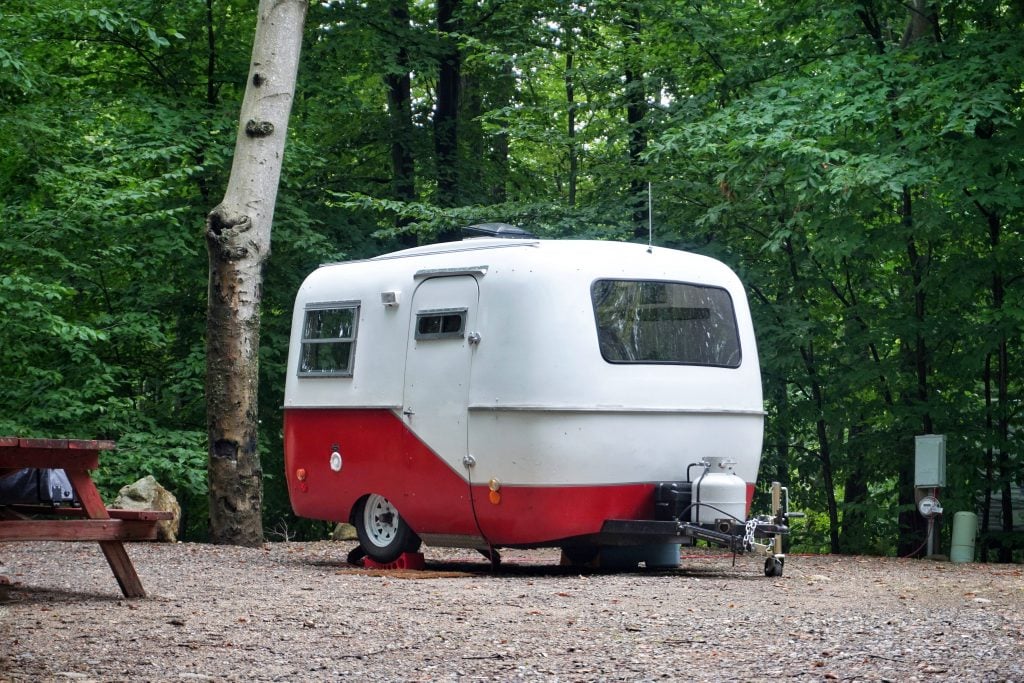
What You Need to Be a Minimalist Full-time RVer
Living in any RV requires a commitment to a more minimalistic lifestyle whether you’re in a 45-foot diesel pusher or a small truck camper or camper van.
There are a couple of reasons a trailer or camper might not be the best choice for full-time living, but it’s worth noting that NO recreational vehicle is built and sold for the purpose of becoming a full-time residence. If you talk to the manufacturers and dealers, they all affirm that RVs are built for periodic leisure use only. Living in an RV full-time puts much more pressure on every system in the rig. The electrical, plumbing, heating, insulation, tanks, and structural framework will all be stressed when in use all day every day.
This continuous use and additional pressure is what makes living in a camper vs a motorhome more problematic. Let’s face it, campers are built to fit into the budgets of a larger share of the market, meaning they are more affordable, but to fit into that lower price range they need to be built fast and cheap. That translates to lower quality components and construction protocols that focus more on quantity than quality.
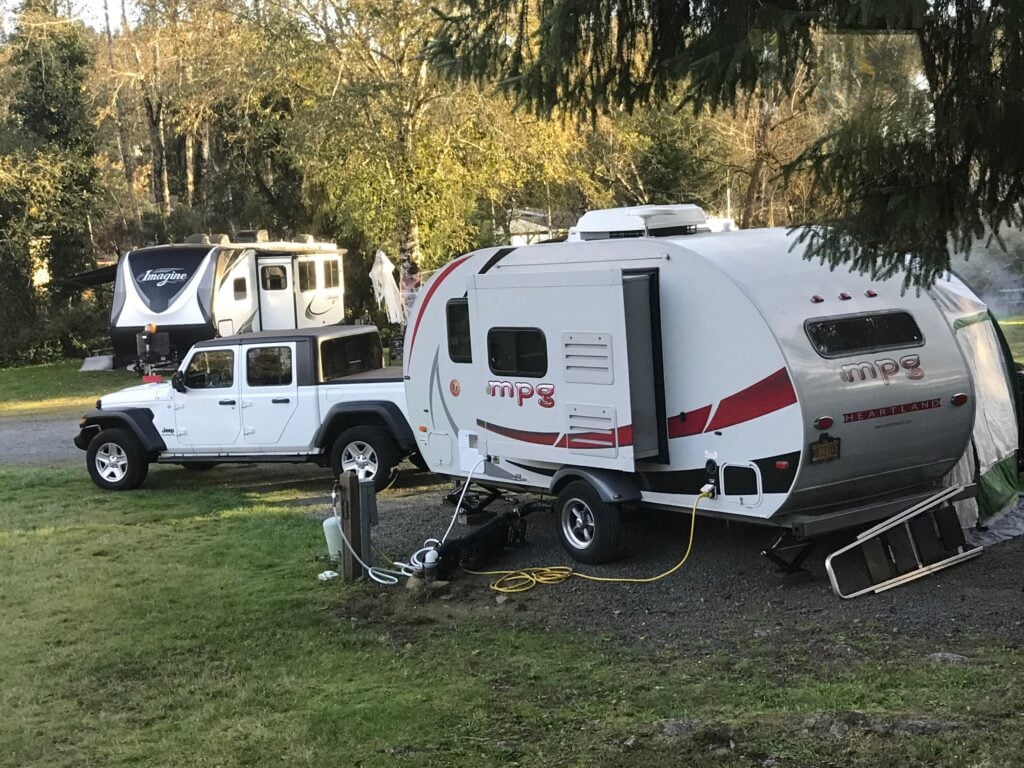
Campers are small, easy to maneuver and park, but lack storage space. Photo by P. Dent
Cons of living in a camper full-time
Smaller components
Another limitation of living full-time in a camper compared to living full time in a larger motorhome is the size of many of the components in the camper. The propane tanks (if they even exist) are usually small portable tanks. These tanks need to be refilled often. The refrigerator and freezer may be quite small. Your freshwater tank, black, and gray holding tanks also have limited capacity.
Many campers do not have a generator. Living full time in those campers requires a connection to shore power for electricity. Or, the camper needs solar panels and a battery system. A portable generator is also helpful.
Be prepared for all kinds of weather
Let’s face it, when you live in an RV you need to take a few more things with you than for camping on a weekend trip or a short vacation. You might need all weather gear. Chains for the truck or trailer, extra coats, blankets, and boots can be necessary too.
You could be camping in the snow or on the edge of a hurricane. It’s not like you can just drive back to your house to wait out the storm. You need to be able to endure whatever nature throws at you.

Not all days are sunny when you live in a camper. Full-timers need to be prepared for everything. Photo by P. Dent
Sure, you’re living in a house on wheels. You should be able to drive away from approaching bad weather. But this is not always possible. For example, a Polar Vortex dropped below freezing temperatures from one coast to the other. It resulted in virtually the whole country suffering in below freezing ice and snowstorms. This storm knocked out power to millions. Thousands of full-time RVers got caught in this dangerous weather.
As full-time RVers, sometimes the only option is to batten down the hatches and endure the inclement weather. But this may be a life-threatening experience in a camper. Without enough extra clothes or blankets, no propane heat option, and the power is out where you’re camping, things get dicey. Larger storage capacity in your full-time recreational vehicle can save your life.
Limited RV storage space
Beyond having enough storage space for seasonal clothes and bedding, you also may want to take your recreational accessories with you like your bikes, kayaks, fishing gear, photo equipment, and backpacks. All that extra gear that you would normally store at your home now needs to be packed and stored in (or on) your RV.
And the storage issue is not limited to outdoor equipment or weather-related supplies. What about extra food? When you live in a camper, you’re not packing food for just a weekend getaway. You’re packing all the food and cooking utensils for everyday meal preparation and there are times when you may be a hundred miles or more from the nearest store.
With a very small refrigerator and freezer, you’ll need to rely on dry goods or canned foods. But all of it takes up space. Many campers are short on good storage space. Are you willing to park your rig near an urban center? If so, you can eat out more often or purchase smaller quantities more frequently. But you can’t always be that close to a grocery store.
Over the past 20 years of RVing, we have camped in dozens of places that just didn’t have any nearby restaurants or groceries. We ate what we had with us and that was all. If you’re in a small truck camper, camper van, or pop-up trailer, you may not have enough storage to sustain a comfortable full-time lifestyle.
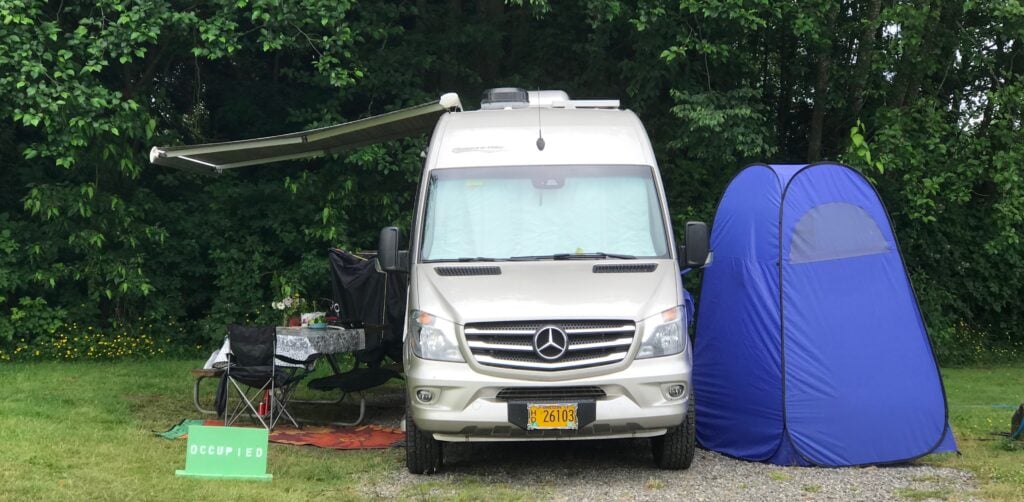
Even with a wet bath, campers may need an exterior shower arrangement. Photo by P. Dent
Pros of living in a camper full-time
Easier maneuverability
There are a few pros to choosing a camper for full-time living. The biggest advantage is that campers are more nimble than large motorhomes and fifth wheels. They can go anywhere a car can go. Campers fit into any campground or RV park They are easy to park in a parking lot of any store while restocking the rig.
If you have a truck camper, you can even remove it from the truck. It’s easy to use the truck without breaking down your camp to fetch supplies. There’s no need to tow a second vehicle unless you want to tow a trailer or boat. We encountered a full-time RVer that lives in a camper van. They also tow an enclosed trailer. She manages all her storage issues by loading the trailer with extra gear and supplies.
More affordable
The other pro of choosing a camper for your full-time adventure is that most of them cost less than a motorhome or fifth wheel. Having said that, I have to acknowledge that some of the camper vans can be as expensive as many Class A and C motorhomes.
Some campers that are in the larger hard-sided trailer category can also be nearly as expensive as smaller Class C motorhomes. We are currently camped next to a hard-sided trailer that is only a few feet shorter than our 38-foot motorhome and the couple who lives in that trailer seem to be well supplied and content with their rig.
Will a small camper meet your personal full-time RV goals?
That depends on you! It depends on your attitude, and your willingness to leave unnecessary material possessions behind. Can you embrace a minimalist viewpoint? Are you comfortable in confined spaces? It depends on your willingness to embrace an outdoor lifestyle. Ultimately, can you be content with your choices?
Drivin & Vibin shares some great tips from their experience in living in small camper full-time in the video below:
Is RV Living Worth It? A Look Back on 17 Months of Full-Time Travel
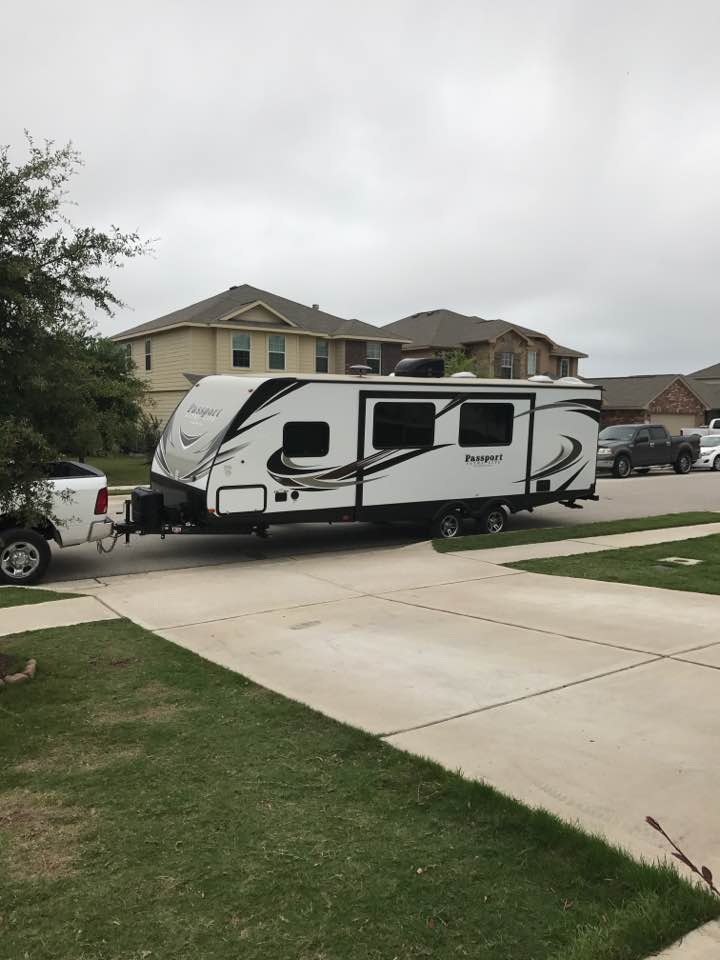
Getting yourself and your family ready for the full-time RV life can be pretty dang stressful and overwhelming. You might even catch yourself as you’re going through this process asking “Is RV living worth it?” I mean, who wants to go through all the trouble of hitting the road if it’s not worth it. Am I right?
Well, let us tell you something.
For us, it was worth it. So, so worth it.
Our Full-Time RV Living Backstory
If you’re new to TREKKN, first let us say welcome! And second, let’s give you a little backstory on us.
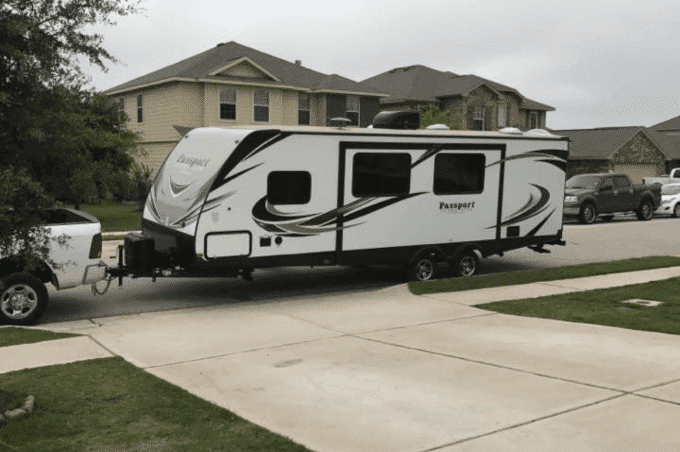
In February of 2017, we decided to RV full-time. Our daughter was in college, our middle son was just about to graduate high school and our youngest son wanted some adventure. We pushed past our fears and decided it was now or never.
Between February and May of 2017, we sold our house, most of our belongings and our cars and hit the road full-time with our three kids in a 26-foot travel trailer. We did this in 100 days. Are we crazy? Why yes, yes we are. You can read our full launch story here.
For a year and a half, we traveled through the United States and Canada. There were hard times, absolutely amazing times, we navigated traveling full-time with one kid in college, we watched our youngest son make some life-long friends, we learned what not to do while camping in the snow and we made our RV feel like home.
After 17 months, 36 US states, 5 Canadian provinces and 15 US national parks, it was time to hang up our full-time RVing hats.
We’ve since shared what life after RV life has been like, as well as opened up about some of the financial realities we faced coming back.
And now that we’re back, we’ve been asked if it was all worth it.
Here’s why we answer that question with a resounding yes!
Why RV Living Is So Worth It
Oh, The Places You’ll Go (And See)
Before we RV’d full-time, we were lucky to go on one vacation a year. For the first six months of RVing full-time, it felt like a vacation (almost) every day. That vacation feeling definitely started to wear off, but…

In a year and a half, we visited 36 states! Not to mention all of the incredible National Parks we saw, both in the US and in Canada.
I feel incredibly grateful for all the places we saw and experienced with our children. It’s fun to watch a movie, read a book, scroll through Instagram, see a destination and realize that not only have I been there, but I created life-long memories with my family there as well.
Which leads me to point number two…
Family Memories
Remember when we…
Those are three words we love to hear come out of our kids’ mouths.
Sometimes it’s looking back on the stressful times, like…remember when we were freaking out because water was flowing through the master bedroom?
And other times it’s looking back on epic hikes.
Sometimes it’s…remember when all five of us lived in a 200 sq. foot travel trailer? That’s my favorite remember when story.
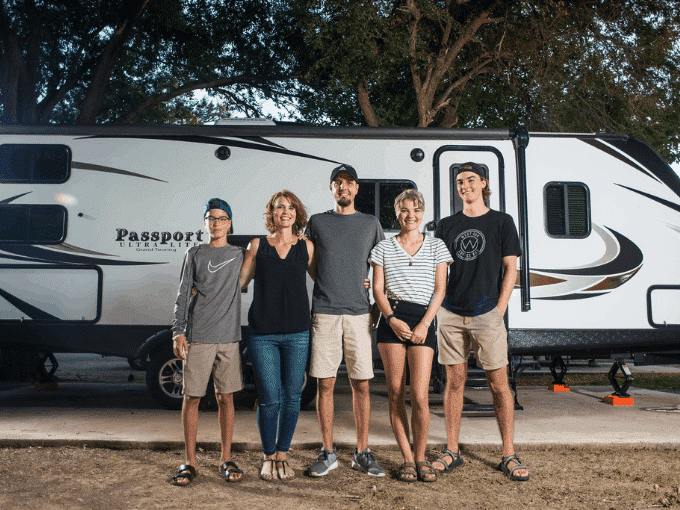
But through the stressful times, the epic moments and those days we did nothing but just hang out at the RV park, we were creating life-long memories we hope our kids will continue to look back on, even as we create new memories, together and apart.
Taking Those Risks
Six months after we stopped RVing full time and moved into an apartment, our oldest son took a seasonal job in Alaska.
He found a job posting for a boat tour company as a barista in Seward, Alaska. He applied, had an interview shortly after, got the job, bought a plane ticket and was on his way to completely unknown territory. (Well, not completely unknown. He was actually born in Anchorage, Alaska and visited Seward when he was a couple of weeks old. But we’re pretty sure he doesn’t remember that.)
He took a risk. A risk we know he’s glad he took. Would he have taken the leap to move to Alaska if we wouldn’t have RV’d full-time? Maybe, maybe not.
What we do know is that during his senior year of high school all anyone talked about was your college path. Where are you going to college? Are you excited about college? What are you going to major in…in college? Those were the questions he was met with on a daily basis. Which can be a big stressor for someone who doesn’t feel the college path is the right path for them.
So that made a gap year (ok, gap year and a half) traveling in an RV full-time such a good decision for him. It not only allowed him to take a step back and figure out his next steps, but it also allowed him to meet others who look at life a bit differently (other than his parents). College isn’t for everyone and I wish schools would focus a little more on that.
I think RV living as a gap year, through all the ups and downs, was definitely worth it for him.

Made Life-Long Friends
I’ll be honest, when we started RVing full-time I had no idea what to expect as far as meeting people. Questions like will we have anything in common with others, do RVers just keep to themselves and what are RVers like anyway were rolling through my head.
But let me tell you, fellow RVers are amazing.
We met so many people along the way and many of those we have stayed in contact with. Some we made a point to meet up with again and either share a meal or you know, travel for two weeks together in Canada.
The people you meet during your RV travels is completely up to you. You can decide to keep to yourself or you can make an effort to talk to your neighbors and invite them over for drinks or s’mores by the campfire. I am so thankful for the people who made an effort to talk to us and vice versa. They made our travels much more enjoyable and we’re grateful to call them friends.

Learning to Live with Less
I used to be a woman who liked my things a little too much. I placed my value in them. They defined me and as soon as I had that one thing I thought I had to have, I was moving on to the next thing.
I’m not exactly sure what made me start to change my way of thinking and what I valued. It might have started with the Minimalism documentary. Just the title of it conjures up all kinds of emotions:
Minimalism: A Documentary About the Important Things.
Important Things. That makes you think. Or at least it did me.
Selling our house that I just knew would make me happy once I had it, and all of the things we had accumulated over 20 years of marriage that I thought defined how successful or valuable we were, was easier than I thought it would be. It felt so incredibly freeing.
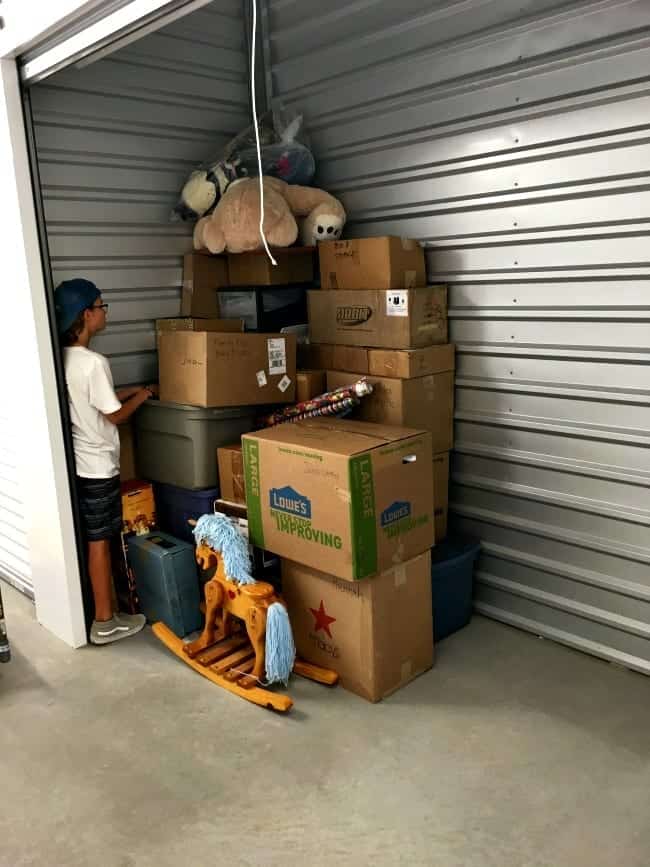
Living in 200 sq. feet for a year and a half really tested the boundaries of what we actually needed to live comfortably. And we loved it. It has absolutely shaped what Todd and I want our future to look like. It’s a future about experiences and not stuff. And that feels amazing.
How can you start living with less?
We started by following the Minimalist 30-Day Minimalism Game. On day one, you get rid of one thing. On day two, two things. On day three, three things. You get the picture. Later we kicked it up a notch and got rid of a household of things, plus the 2,300 sq. foot house.
But we started with one thing. Try it. It might just change your life.
Will RV Living Be Worth it for You?
I don’t know if RV living will be worth it for you. I know there are stories of people who tried out this lifestyle and just didn’t like it. It’s easy to get sucked into the world of social media where everything is beautiful and life is perfect. You see an RV parked in the mountains and you think I want that.
But sometimes this is the actual reality (via Trailing Away on why they quite RVing):
Yes, RVing was much more expensive than we expected. RV parks annoy us, moving too often was exhausting, and there is always a chance that something major will go wrong with your home at any time. But, the big problem was us. We had unrealistic expectations, didn’t plan ahead as much as we should have, and had less-than-positive attitudes most of the time.
Do they regret their decision to RV full-time? Nope. Not at all. What they learned far outweighed the hard parts. But it’s good to read stories like theirs to put everything into perspective. (Be sure to hop over to their website to see what they’re doing now!)
The bottom line is, you won’t know if it’s worth it for you personally until you try it. But there are several different ways of trying it other than jumping in 100%:
- You could rent an RV to see if you like it
- You could borrow a friend or family member’s rig to try it out
- You could keep a home base and try out the RV lifestyle for a few months
Future Plans?
Todd and I have been asked quite a bit now that we’re stationary if we’ll RV full-time again. The short answer: we have no idea. We’re trying really hard to be fully present in our current season of life.
Our last kiddo will graduate high school in 3 years. We want to soak in every minute of it with him. Our middle son comes home from his seasonal job in Alaska soon and will figure out his next steps. We want to be there for him as he makes those decisions. Our daughter is entering her senior year of college and is both freaking out and getting excited about the future. We want to be available to freak out and get excited right along with her.
For us, RV living was worth it. We did something hard and new and abnormal. We went against the flow. It shaped how we view the world and put into perspective what’s really important in our lives.
We encourage you to take some steps, however small or big those steps might be, to do something hard, new and abnormal. Don’t be afraid to do something just because it goes against the normal flow of society or of your particular community. Who knows…that something you choose to do just might be living in an RV full-time.
PIN THIS
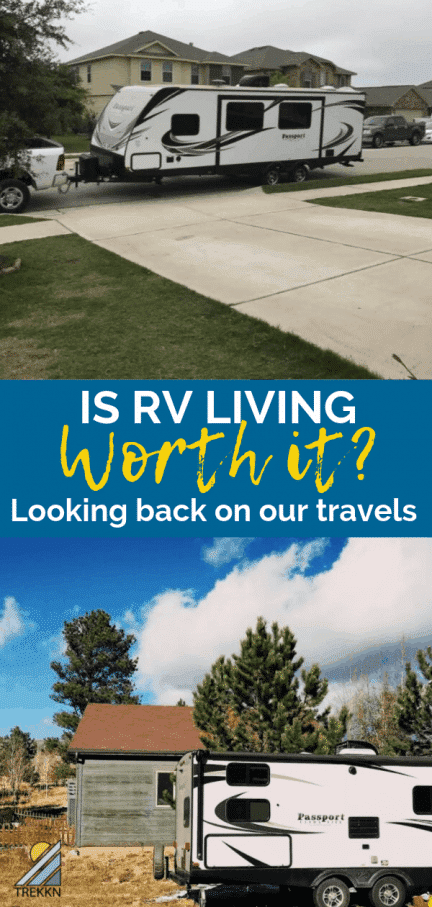

Julie Bonner is one-half of the TREKKN team. She specializes in helping you whip up delicious meals in your tiny RV kitchen, as well as RV organization tips and helping fellow RVers make their RV feel like home. Her favorite RVing spot is in Banff National Park in Canada where yes, the water really is that blue and the people really are that nice.
Pros and Cons of Living Full-Time in a Travel Trailer

Just over a year ago, our full-time adventure of living in a travel trailer and exploring the continent ended.
To say it was unforgettable would be an understatement. To say it was beautiful would not do it justice. To say it was an opportunity to grow and explore our limits would be accurate.

The pros and cons of living full-time in a travel trailer will be different for each individual. We’ve written fairly extensively about that experience since it began in May 2017.
We’ve shared plenty of lessons we learned and takeaways that will hopefully help you in the decision-making process if you’re considering this route. But we’ve never done a complete Pros vs. Cons post to help give you the big picture of the experience.
I’d say it’s about time for that after nearly one-and-a-half years in our 200 sq ft adventure capsule and now a year of looking back and processing that unique period in our lives.
Pros and Cons of Living Full-Time in a Travel Trailer
Let me start off by saying that my level of gratitude for this opportunity we had to RV full time is completely off the charts. I know how much of a gift that is.
I understand that the majority of the population could never even imagine having the chance to do what we did, for a variety of reasons. And I am thankful every day that it became a reality for us.
*If you want to get a better idea of how we made money while we were traveling to make this adventure possible, read this post.*
For us, this was not a “money-saving” move, not by a long shot. You can get a better idea of what it cost us by reading this post. But what we got out of it was utterly priceless, in so many ways.
Lastly, I want to point out that this list assumes you will be traveling while living in the travel trailer, not sitting stationary in a single location.
With that, let’s take a realistic look at the pros and cons, the positives and negatives, of living full-time in a travel trailer…from our perspective at least.
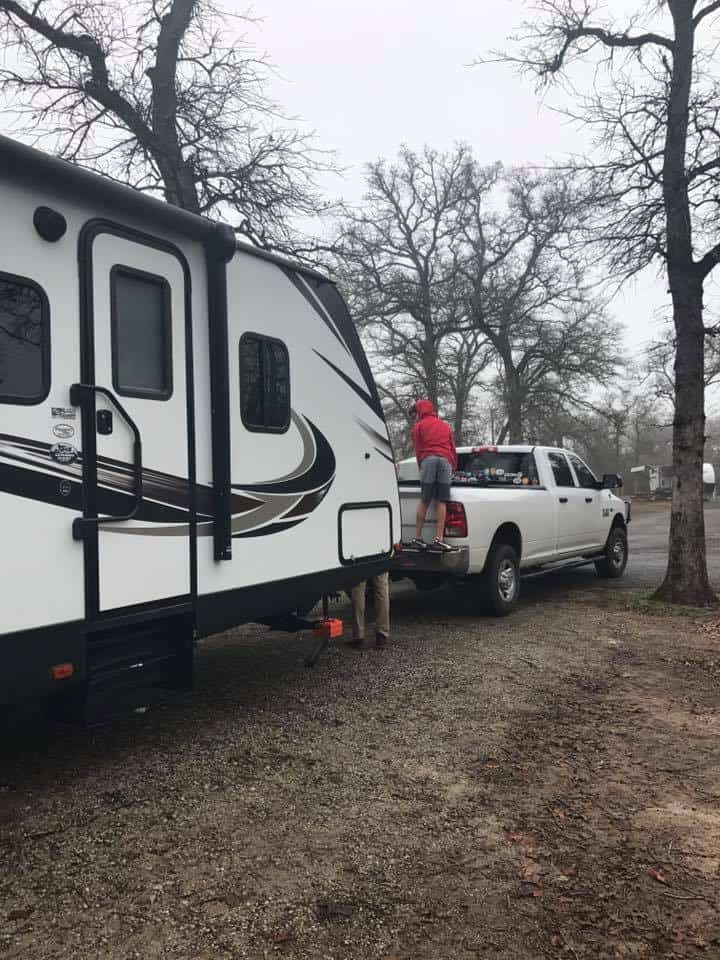
Pro – Lower Overall Purchase Price and Maintenance/Repair Costs
*To see all of the nitty-gritty details about our truck and travel trailer purchases, as well as the sales after the journey ended, check out this beefy post.*
As you might have picked up on in some of my other posts on the site, I am a details and a numbers kind of guy by nature. In most situations, I need the numbers to make sense before I can fully buy into a choice or a direction.
That’s not to say that I haven’t learned a thing or two about letting go from our full-time RVing experience. But still, details and numbers are in my DNA.
So when it came time to decide on the type of RV we were prepared to live in full-time, I took the decision very seriously. Since we were new to the world of RVing, we started out by considering every single type of RV from Class A down to travel trailer.
But as I covered in detail in this post, solid information provided by our salesperson about the realities of financing an RV quickly narrowed our search focus down to just travel trailers.
It’s what made sense for us when we really started looking at the numbers, and specifically at the amount, we would be required to provide upfront as a down payment (20-30% of the purchase price if you’ve got “good” credit with a 700+ credit score).
THE SIMPLER, THE BETTER: WHO NEEDS “BELLS AND WHISTLES”?
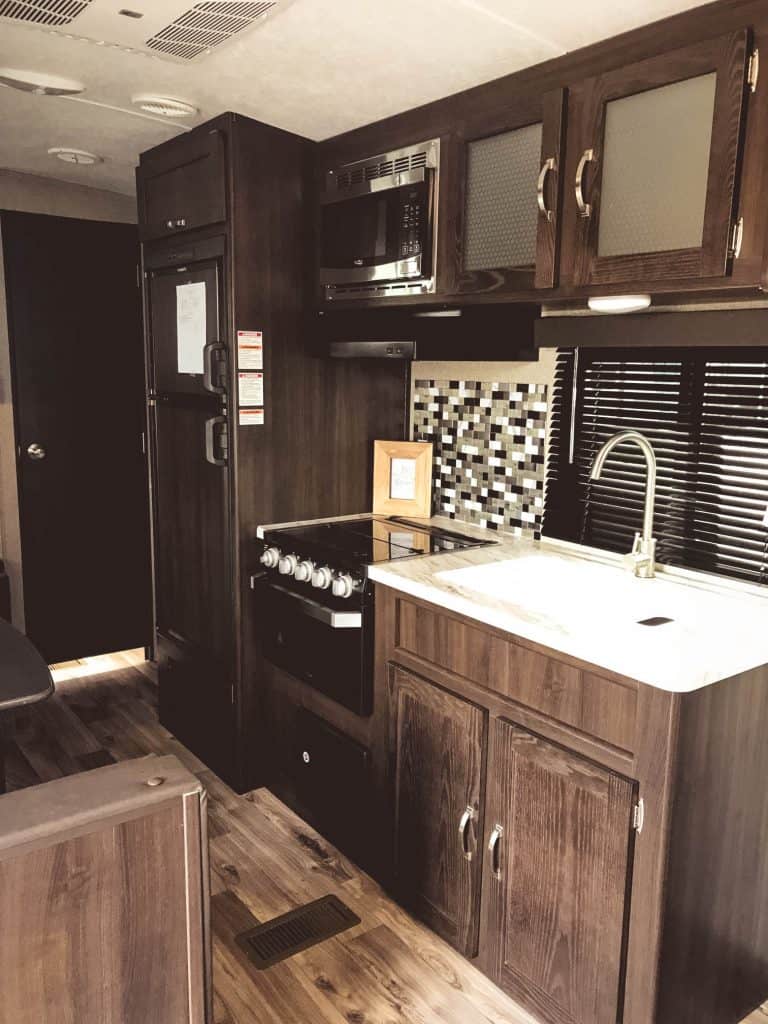
As a child, I think my dad influenced me early and often with his perspective on simplicity…at least when it came to automobiles.
I distinctly remember when I was about 11 years old and we were buying the first new car that I had ever experienced: a gold 1986 Mazda 626 sedan.
It was the first time that I remember hearing him talk about how we didn’t really need the “bells and whistles” on a car, like power seats or windows, that was just another opportunity for something to go wrong.
No, he was far more interested in the overall reliability ratings on a vehicle. He wanted to know whether this engine and transmission would stand the test of time.
And since he was preparing to move our family thousands of miles east and into another country (Canada) in the near future, that reliability factor took on even greater significance.
He wanted it to get us there safely and without added hassle and expense, not pamper us along the way.
Honestly, I think in a lot of ways my own perspective on “things” in life mirrors his.
I felt it come to the surface as we looked at dozens and dozens of different travel trailer models.
I would look at a fancy upgrade and think, “How long until that feature goes haywire?” I would see a model that had two slides instead of one and think, “That’s just another chance that we could face those dreaded issues with a slide I’ve been reading about.”
PESSIMISTIC OR PRAGMATIC?
You may see this as pessimistic; I guess I view it as pragmatic. I view it as playing the odds, for lack of a better term.
For our maiden voyage in this RV, I wanted to face the fewest possible issues and cough up the lowest amount of maintenance and repair costs I could. I wanted to keep things simple while still ensuring we had a reasonable level of comfort and convenience.
For our situation, the travel trailer absolutely made the most sense from a cost and simplicity standpoint. I have no regrets and view these factors as major pros for the travel trailer option.
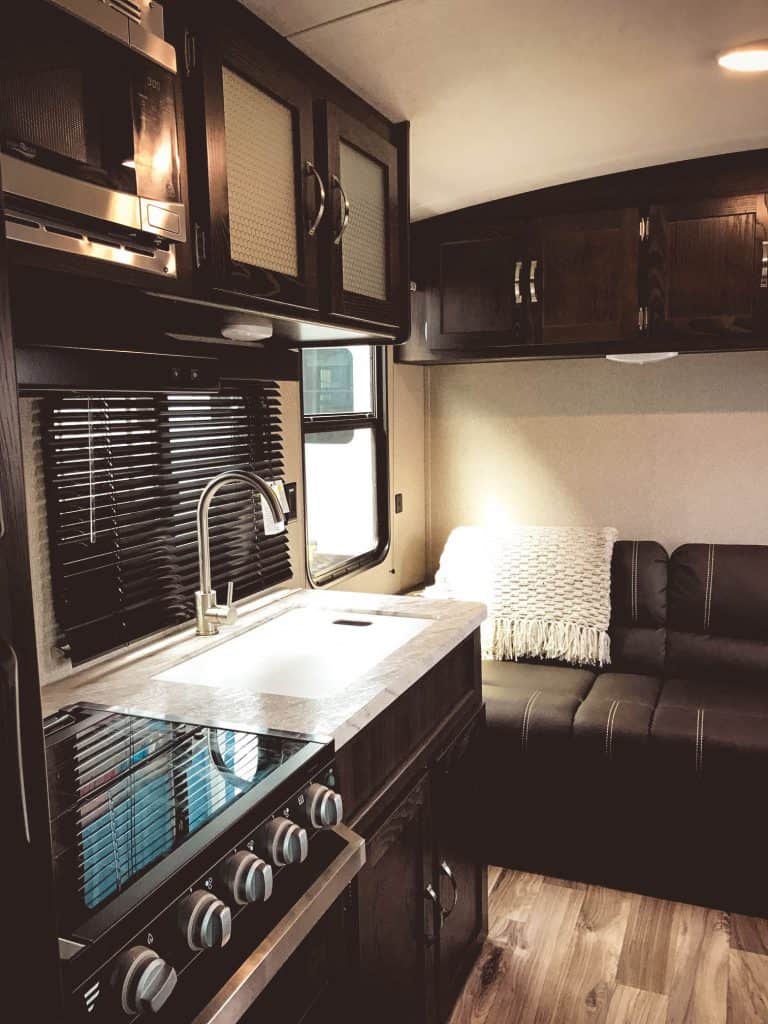
Con – You’ll Rub a Few More Elbows with Family
Generally speaking, you are going to have less space in a travel trailer than you would experience in a fifth wheel. It seems pretty obvious, right?
Not only will travel trailers normally be shorter in length, but they will also typically include fewer slide-outs that create more interior space.
On fifth wheels, you can find as many as four or five slides on a large rig, while travel trailers normally top out at two (maybe three in rare situations).
But what does that tighter space make things look like on a daily basis?
It looks like more coordination and cooperation during meal prep time to navigate the common space that serves as the kitchen/living/dining area.
It might look like using the dining room table as a study area, then reading area, then TV watching area, then sleeping area, requiring several transitions throughout the day.
And it could involve getting a bit cozier around the dining table than you might be used to. (Our norm was mom and dad eating on the couch, three kids at the dining table, to avoid those bumped elbows.)
TIME TO GET CREATIVE
But are there some ways to address this issue and create some more livable space…in the proper climates, at least.
After nearly a year on the road, we decided to purchase a fantastic pop-up gazebo that created additional outdoor living space protected from insects and (partially) rain.
We all wished we would have made that purchase sooner, because it not only provided the additional space that is so precious during full-time RV travel but also added to the amount of time we spent outdoors on a regular basis.
Looking back, we still feel it was one of the best purchases we made during our time on the road.
So yes, you will have less indoor space to work with. But if you are willing to bring patience, cooperation and creativity along for the ride you can absolutely still make it a positive experience.
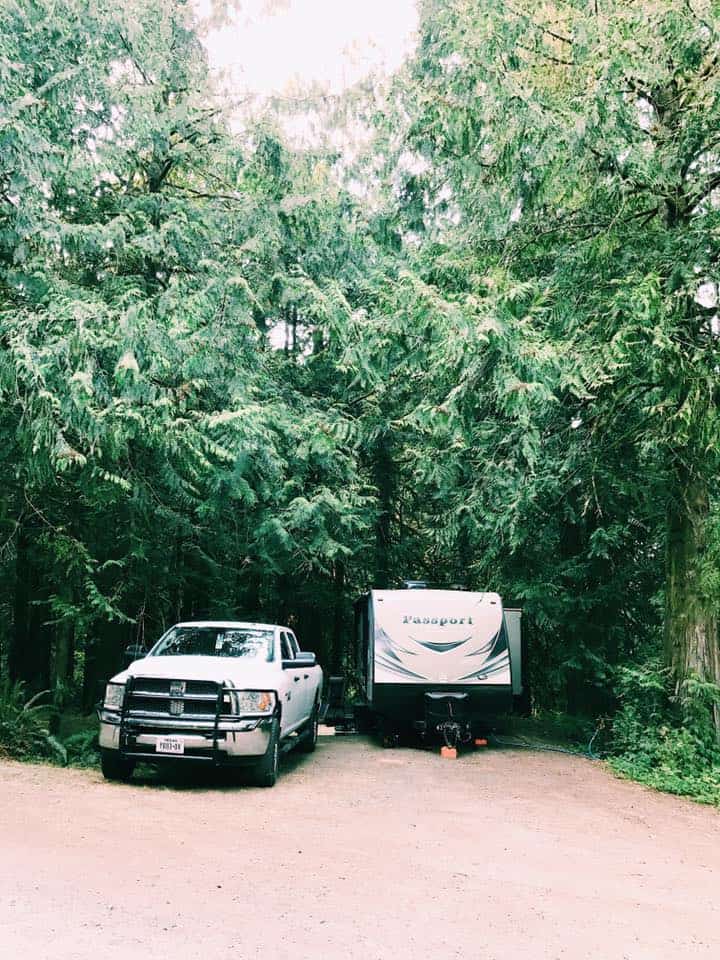
Pro – You’ll Need Less Truck to Tow a Travel Trailer
Surprise! It’s another financial advantage of a travel trailer! What can I say? It’s an important factor in my world of limited resources. (If you live in a world of unlimited resources, the next Pro that I cover below may still steer you in the travel trailer direction.)
As we shopped for an RV and narrowed our search down to towables, it was never far from my mind that an additional purchase was just around the corner: A truck capable of safely pulling whatever RV we purchased.
I had picked the brains of truck-owning friends and scoured online RV forums as I wrestled from the very beginning with what type of truck to purchase when the time came.
Many RVers proved to be outspoken proponents of buying the beefiest truck you possibly could from the beginning (normally meaning a 1-ton diesel).
Their reasoning was that even if you buy a smaller RV now (travel trailer), odds are good that you will want to upgrade one of these days, requiring a larger truck.
They felt strongly that buying the “max truck” now would keep you from having to upgrade both your RV and your truck at the same time down the road, which could prove very difficult to pull off financially.

DIFFERENCE IN RESALE VALUE IS A FACTOR
Many also felt that the far higher resale values on diesel trucks, compared to gas trucks, further justified the higher purchase price now. Given the number of miles I was planning to drive whatever truck I purchased, this reasoning carried the most weight with me.
And it almost pushed me to opt for a 3/4 ton diesel instead of the 3/4 ton gas model that I eventually purchased.
But at the end of the day, I just wasn’t prepared to deal with that additional expense (easily $10-15K more) that a diesel truck would require.
I was also intimidated by the additional maintenance and care that a diesel engine requires, having never even owned a truck before.
And because I was looking closely at purchasing a travel trailer with a gross weight of about 6,500 pounds, and had no thought of ever going with a larger RV than this, I knew that a 3/4 ton gas truck could get the job done.
You can see the reality that we faced at the end of our journey by reading this post, but the short version is that I owed $9,000 more than the truck was worth when I went to trade it in last year. (We put over 48K miles on the truck, so…)
Yes, I could have reduced that negative equity by trying to sell it instead of trading it in. In our situation, that wasn’t really a feasible option.
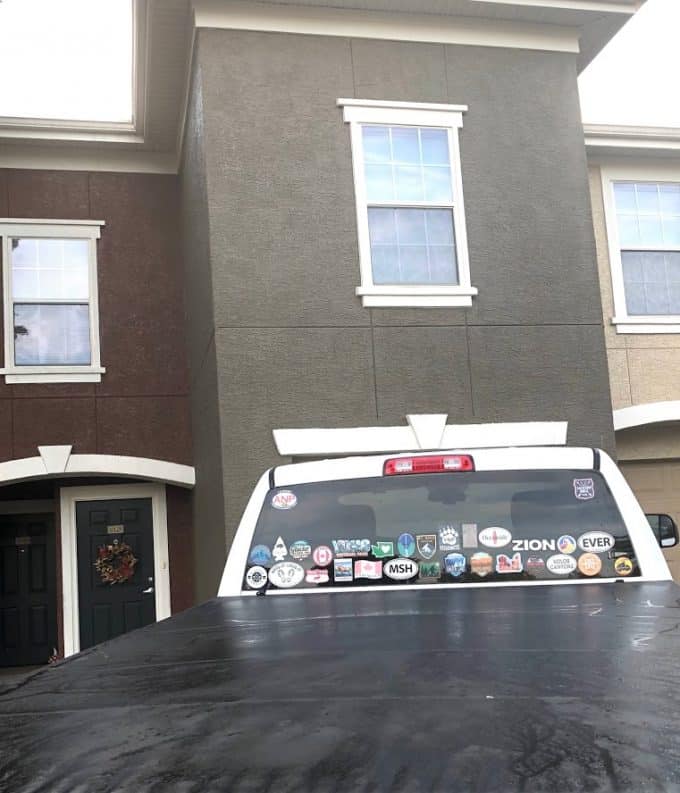
SO THIS IS A PRO WITH A CAVEAT
Looking back on it now, I can’t really say that I regret going with a gas truck despite the “financial reckoning” after the fact.
Is it possible I could have come out better financially if I had gone with a diesel? Yes, it’s possible. But that option would also have required a considerably higher monthly payment during our time on the road, which might have given me heart palpitations.
So the caveat is: You CAN go with less truck if you purchase a travel trailer vs. a fifth wheel. Only you can decide if you SHOULD go this route when you look at all factors involved.
Con – No Movie Nights At Your Place
During our travels, we spent a couple of weeks traveling up into Canada (Prince Edward Island and Nova Scotia) with a family that we met on the road. It was some of the best times that we had during our journey.
These friends were traveling in a large fifth wheel that held their family of five. And it was a really spacious and convenient rig that we thought was amazing.
We were able to have our family of five crash their fifth wheel for both a movie night and a top-notch brunch while in Nova Scotia. (The movie was Robin Williams’ “RV”, and this was the first time any of us had seen it, believe it or not.)
This is in addition to the countless times that our 14 year old spent the night in the rig with their boys. So yeah, great memories all around.

That time together, with all ten of us enjoying one space, was really enjoyable and memorable.
When we commented about how nice it was to be able to entertain folks (something our rig would not allow), they said that this was one of the reasons that they had gone with this fifth wheel.
They knew it would allow them to be hospitable with folks that they met and that was important to them.
Of course, we would have the same opportunity if the weather permitted and we wanted to entertain outside our rig. But definitely not inside.
Take that into consideration when you make your decision about which rig is the best fit for you.
Pro – Easier Access to More Locations
When we were making plans for our travels, I had big plans about being able to stay in state and national parks as much as possible.
I quickly picked up on the fact that each park like this, however, would have its own limits on RV size that were normally more stringent than your typical RV park or private campground.
Basically, I determined that if I kept our rig under 30 feet in total length (with tongue included), I should have access to more than 85% of state and national park campgrounds.
Since I was already unsure if I wanted to tow anything larger than that 30-foot rig, this was kind of the deciding factor for me.
Staying under 30 feet would give me an acceptable level of comfort with towing (something I was very new to) and would not limit our options in locations that we were very interested in visiting.
While we didn’t end up staying in nearly as many state and national parks as I had hoped we would, I still don’t regret the decision to stay under that 30-foot mark.
It would have made some of our RV parks and campground stays MUCH more stressful and complicated to have a larger rig. We barely fit into some of the spots!
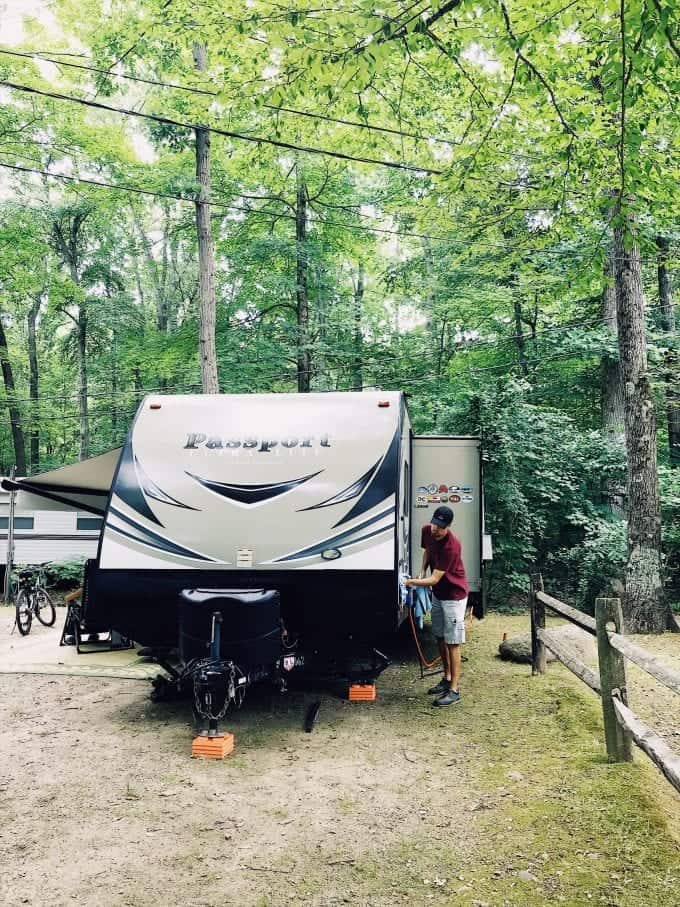
RV HEIGHT MATTERS ALSO
When you’re RVing the western portion of the US and Canada, you don’t run into many spots where the height of your RV requires you to reroute and potentially add distance and time to your trip.
However, if you find yourself drifting toward the northeastern US, you will quickly discover that the height matters a whole lot more.
All of a sudden, you’ve got to be on high alert and ensure that you don’t head down the wrong road with low clearances that will cause you serious problems.
In our 10′ 6″ high travel trailer, we ran into only one situation in the northeast where we had to reroute because of clearance issues. If we had been in a fifth wheel, with typical heights of 12′ to 13′ or more, it would have been a far different story.
Yes, there are resources and apps available to you if you are in a larger rig that will help you route away from low clearance roadways. It could add time and distance to your travels, but it will keep you safe and out of trouble.
Con – Interior Clearance Is Much Lower
In our 26 foot RV, we had ceiling heights of about 6′ 6″, which is fairly typical. Since our tallest occupant was about 6′ 1″, we were able to make it work without any major difficulties.
I will say that I knocked my head going through our exterior doorway on more than one occasion. It required me and my oldest son to stoop down a bit to get through without incident.
There is no doubt that the lower ceilings in the travel trailers give you a “cozier” feel. Some might say a “tighter” feel. For some folks, this isn’t a problem. For others, it may be a night and day difference.
Because I have to say that hanging out in our friend’s fifth wheel while we were traveling with them was just a completely different experience.
With ceiling heights at 9′ or so, it obviously just gives the whole space a very open and welcoming feel. The difference between the two really is a night and day difference, in my opinion.
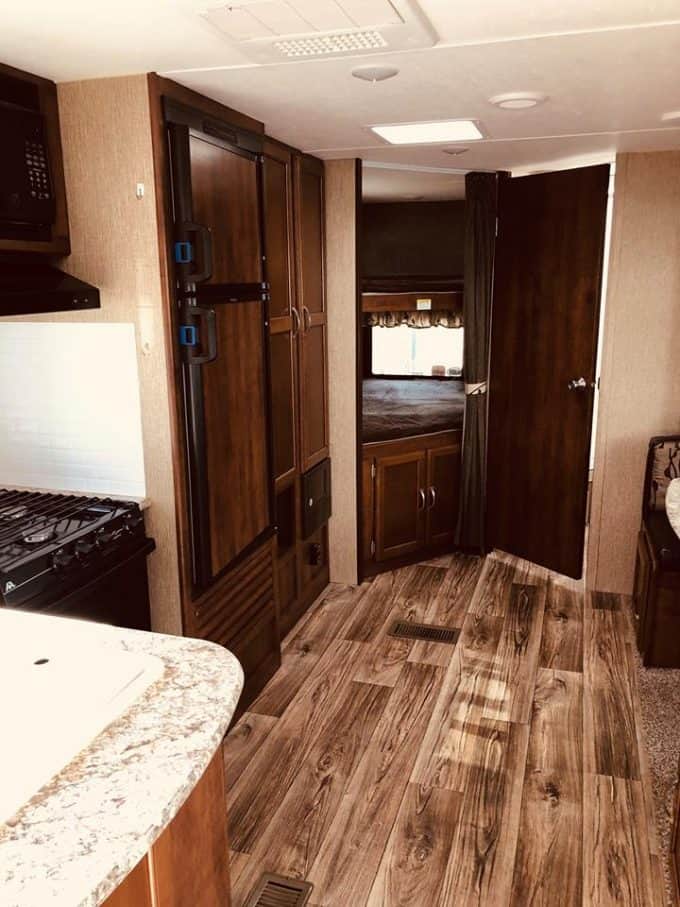
The lower ceilings of the travel trailer are going to lead to amplified noise as well, so be aware of that if you have loud individuals (you know, small kids or dogs) along for the ride.
Since my ears are pretty sensitive to noise, this would probably have proved very challenging for me with small kids or dogs in the rig.
Lots of factors to consider, I know. I hope that these “nuances” of each space help you to make the decision that is best for you.
You’ve Got the Pros and Cons of Living in a Travel Trailer…So What Will You Choose?
As I said from the beginning, all of these pros and cons are based on our personal experience and on the things that we viewed as “issues” during our travels.
Some of these items may make no difference to you whatsoever, and some may be game-changers.
My advice is simply to be sure to talk through all of these pros and cons, and any others you can come up with, with everyone who will be living in the RV.
You need as many different perspectives and opinions as possible with such a major decision like this. Best to see things as clearly as possible now rather than realize your oversight after the purchase.
As you walk through it and move toward the full-time RV lifestyle, we wish you grand adventures, priceless memories and smooth travels! May the road rise to meet you.
PIN THIS




Todd Bonner loves a competitive game of table tennis, a breathtaking hike and simply exploring new places. He spends most of his time sharing information about RV travel and safety, RV accessories and tips, and the National Parks he has visited and still desperately craves. When he’s not busy working on TREKKN, you will often find him staring at pictures of Glacier National Park (probably his favorite spot on earth) or creating new products for Clever Camper Company.
Related Posts:
Sharing is caring!
4 Lessons I Learned From a “Gap Year” on the Road
Monday 21st of June 2021
[…] life comes with a plethora of pros and cons, as do most things in […]
Thursday 17th of June 2021
For many of us we can’t afford a 200k RV and 50k truck to pull it with when Houses are that much or even less. I have live in 20′ 9″ foot pull behind “Camper” that needed to be gutted I bought for $50 off of Craigslist and can be pulled by my SUV that I already own. It started out as a 18 foot camper that I added 2′ 9″ to the frame and rebuilt it from the frame up, to build a “wet room” for a bathroom and a clothes closet area in the other 4 feet. Before deciding to do this I did a lot of research, first and foremost I didn’t buy the standard Camper 2×2, I bought 2×4’s and simply cut them in half, why? cost, while a 2×4 is 60% more than a 2×2 you get twice the board foot out of it so I saved 40% on the framing alone, Then I used spray foam insulation and used discontinued wood paneling from Lowes also for pennies on the dollar for the inside walls and for power I installed an RV solar power unit that doesn’t need a power pack or storage bank. I bought the toilet, kitchen sink and kitchen cabinets at the Habitat for Humanity Re-store for pennies on the dollar and threw a coat of paint on them, Then I bought a “hide-a-bed” couch at a flea market for $15 and took the guts of the hide-a-bed out threw away the rest of the dingy couch and refurbed the bed frame and built my own couch out wood and pieces of foam that I cut and covered with fabric, when I’m not sleeping the bed folds neatly up and becomes the bottom of the couch. I bought a 3/4 apartment sized refrigerator at a discount appliance outlet for next to nothing and bought a multi-functioning air fryer/oven combo that does 9 different things to cook in along with an Insta-pot. No actual stove needed so I actually have counterspace. I realize that it wouldn’t work for a family but it works great for me and my financee.
Thursday 17th of June 2021
Hey Bryan! Thanks so much for your comment. and wow! I am seriously impressed with your commitment to getting a project like that done on the cheap. Kudos to you!
I definitely hear you about not being able to afford some of the “luxury” options out there. We got started with an older truck and relatively cheap and small travel trailer (compared to most full-time RVers at least) because that is what we could swing at the time. That is how we made a dream come true. You seem to have that same commitment.
I love to hear that you have created an “adventure capsule” that works for YOU, because ultimately that is the only thing that matters. Whatever works for you!
Peace, Bryan! Thanks for stopping by and I hope you will stick around.
Can You Live In a Truck Camper Full Time? – TREKKN RV & Travel
Wednesday 10th of February 2021
[…] full-time RV options of all shapes and sizes out there to explore. (You can start by checking out our post on the pros and cons of living in a travel trailer, based on our 17 months off full-timing in a 26-foot trailer. Or this one about small 5th wheel […]
We’re Renting Our Way to Our Next RV Purchase – TREKKN RV Travel
Friday 21st of February 2020
[…] Truthfully, we may end up trying out more than one small travel trailer like this. Our Keystone Passport travel trailer served us so well on our first full-time adventure that we would be crazy not to consider this is an option for our next round. You can read our post about the pros and cons of life in a travel trailer here. […]

Hi, we’re Todd and Julie and we are here to help you Embrace the Outdoors. After spending 17 months RVing with our 3 older kids, visiting 36 states, 5 Canadian provinces and many National Parks, we’re sharing everything we know and love with you. READ MORE
Connect With Us!
TREKKN LLC is a participant in the Amazon Services LLC Influencers/Associates Program, an influencer/affiliate advertising program designed to provide means for sites to earn advertising fees. As an Amazon Associate, I earn from qualifying purchases.
Source https://rvlife.com/living-in-a-camper-full-time/
Source https://trekkn.co/is-rv-living-worth-it/
Source https://trekkn.co/living-full-time-in-a-travel-trailer/